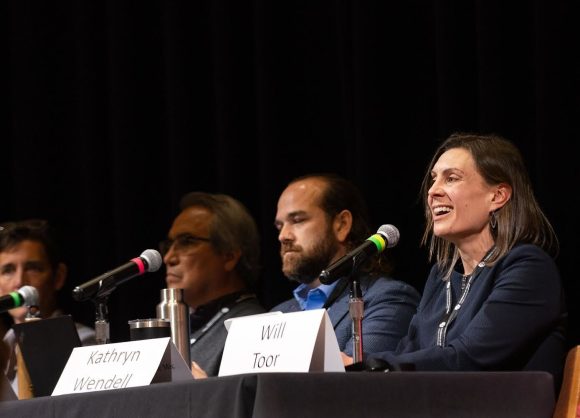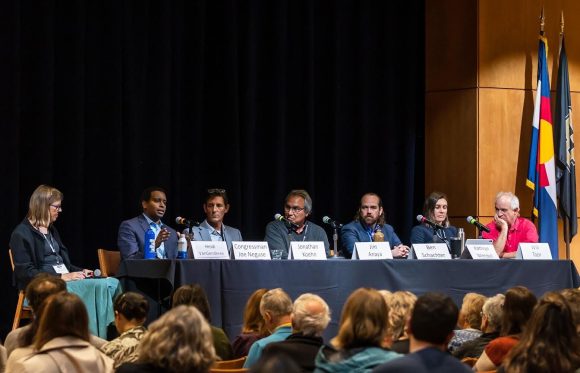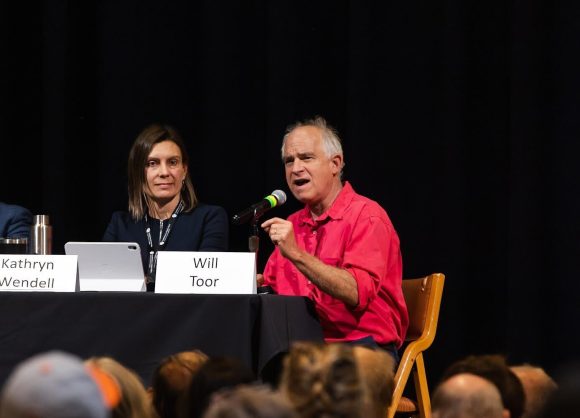
Panelist Kathryn Wendell speaks at the University of Colorado Boulders’ Conference on World Affairs on April 14, 2023. (Lourdes Camarillo/CU Independent)
The University of Colorado Boulder hosted the 75th annual Conference on World Affairs, featuring multiple panel discussions on global issues between April 12 and 14.
The panel, “Enacting Climate Solutions Through Human Rights Climate Commitments: Right Here, Right Now Boulder Impact Forum,” specifically focused on climate change through the perspective of human rights. In December 2022, Boulder previously hosted the Right Here, Right Now Climate Summit which discussed a similar topic.
“Bigger than any other single cause of human rights harm that you can imagine is inaction to stop climate change,” said panelist Ben Schachter, a human rights officer and environment team leader at the United Nations Office for Human Rights.

Joe Neguse, Jonathan Koehn, Jim Anaya, Ben Schachter, Kathryn Wendell and Will Toor, along with moderator Heidi VanGenderen at the 2023 Conference on World Affairs on April 14, 2023. (Lourdes Camarillo/CU Independent)
The panelists discussed the responsibilities that various organizations and levels of government have to stop climate change and preserve human rights. Congressman Joe Neguse joined the panel to speak on his perspective on those responsibilities.
“We have obligations, of course, as the federal government to our own citizens and to humanity to do everything we can to save this one wonderful planet that we share,” Neguse said.
Neguse discussed recent improvements in the federal government’s efforts to stop climate change.
“I would say that, prior to about two years ago, much of what was happening at the federal level was very dispiriting,” Neguse said. “I don’t know that the federal government was meeting its obligations.”
Neguse specifically discussed the Inflation Reduction Act as an area of federal growth against climate change, saying that the IRA “included the most significant investments in the fight against climate change in the history of the United States.”

Panelist Will Toor speaks at the “Enacting Climate Solutions Through Human Rights Climate Commitments: Right Here, Right Now Boulder Impact Forum” panel at the Conference on World Affairs on April 14, 2023. (Lourdes Camarillo/CU Independent)
The panel also discussed climate action at the state and local levels.
“I would argue that Colorado is perhaps the most exciting state in the country right now when it comes to clean energy policy,” said panelist Will Toor, the executive director of the Colorado Energy Office.
While the discussion highlighted recent improvements, Jonathan Koehn, a panelist and the director of climate initiatives for the City of Boulder, noted the still-present shortcomings of current climate action.
“This community in Boulder obviously has prioritized environmental issues and sustainability for a very, very long time,” Koehn said. “Over the past couple of years, I think we’ve recognized that even in a place like Boulder, the current approach is largely insufficient to match the speed and scale of what science is telling us we need to do.”
Other panelists echoed Koehn’s call for urgent climate action.
“Climate change is not just some far-off issue that isn’t with us now,” said James Anaya, a panelist and professor of international law. “It is a crisis that is happening now and affecting the human rights of real people today.”
Contact CU Independent Staff Writer Jessi Sachs at jessi.sachs@colorado.edu.
Contact CU Independent Staff Photographer Lourdes Camarillo at lourdes.camarillo@colorado.edu.
